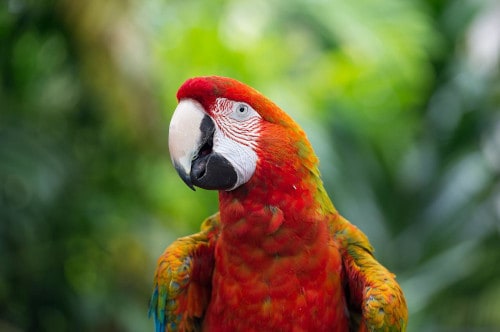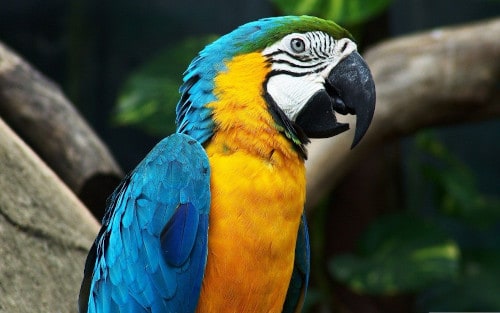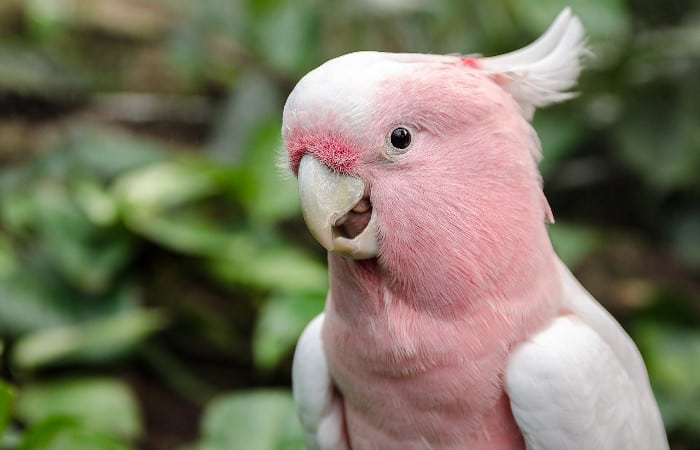Have you ever seen a parrot open and close its mouth? Why do they do that?
It can be quite amusing to watch, but it’s actually a very common behavior for these birds.
It turns out that there are several reasons why parrots do this.
In some cases, it is a way for them to communicate with other parrots.
In other cases, it is a sign of stress or anxiety.
In this blog post, we will explore the reasons behind this peculiar habit and discuss some of the potential benefits it provides.
After reading this post, we hope you will better understand your favorite pet parrot.
Is it normal for parrots to open and close their mouth so often?
Parrots are interesting creatures, and they are also known for their colorful plumage and inquisitive nature.
One thing that sets parrots apart from other birds is their habit of often opening and closing their beaks.
While this behavior may appear strange to us, it is actually quite normal for parrots.
Beak gaping is a way for parrots to regulate their body temperature.
By opening their beaks, parrots can cool down on hot days, and by closing them, they can stay warm on cold days.
Additionally, beak gaping helps parrots to keep their beaks healthy and free of debris.
So, while it may look odd to us, there is no need to worry if your parrot frequently opens and closes its beak.
You may also like: Why Is My Parakeet Drinking So Much Water?
Why do parrots keep opening and closing their mouth?

Parrots are interesting creatures, and one of the things that people often wonder about is why they keep opening and closing their mouths.
There are 10 reasons for this behavior.
Eating
One reason why parrots keep opening and closing their mouths is that they are eating food.
Parrots have high metabolisms, so they need to eat often in order to stay healthy.
Preening
Another reason is that they use their beak to preen their feathers, which helps to keep them clean and healthy.
When preening, parrots will often open their beaks and use their tongue to reach the feathers on their chest and back.
Preening is important for parrots because it helps them to stay clean and removes any parasites that might be on their feathers.
Beak gaping
Finally, parrots may also open and close their beaks as a way to regulate their body temperature.
This behavior is known as beak gaping, and it helps parrots to stay cool on hot days and warm on cold days.
If your parrot is opening and closing its mouth often, make sure that the temperature around its cage is not too hot.
Greeting
In some cases, parrots may also open and close their beaks as a way of greeting other birds.
This is especially common among parrots that live in social groups.
Stressed
If your parrot is opening and closing its mouth often, it may be a sign that it is feeling stressed or anxious.
If you think your parrot may be stressed, try to provide it with a calm and quiet environment.
Additionally, you can try giving your parrot some extra attention and care.
Hungry
Another reason your parrot might be opening and closing its mouth is because it is hungry.
If your parrot is opening and closing its mouth often, make sure to give it food regularly.
Thirsty
If your parrot is opening and closing its mouth, it might be thirsty.
Parrots need to drink water regularly to stay hydrated.
Make sure to give your parrot fresh water every day.
Boredom
If your parrot is opening and closing its mouth often, it might be boring.
Parrots are intelligent creatures and need stimulation to stay happy.
Try giving your parrot toys to play with or letting it out of its cage for some exercise.
Yawning
Parrots yawn quite a lot. When they yawn, you see that their mouths open and close.
Yawning is a way for parrots to release tension and relax.
If you see your parrot yawning often, it may be tiring. You can put its cage in a quiet corner and let it take a rest there.
Illness
Finally, parrots that keep opening and closing their mouths too often may be a sign of illness.
If your parrot is also lethargic, has a loss of appetite, or produces mucus from its beak, take it to the vet immediately.
Parrots are prone to respiratory infections, so it’s important to get them checked out by a professional if you think they might be sick.
You may also like: Why Is My Parakeet Not Drinking Water?
Why does my parrot stretch his neck with his mouth open?
Most people are familiar with the sight of a parrot stretching his neck and opening his mouth, but they may not know why he does this.
This behavior is actually part of the process of regurgitation, which is when a bird brings partially digested food back up from his crop.
A parrot will typically stretch his neck and open his beak just before regurgitating, as this helps to expel the food more easily.
Regurgitation is a natural process for many birds, and it helps them to digest their food more effectively.
Some parrots even use regurgitation as a way to bond with their mates, as they will share partially digested food with each other.
So if you see your parrot stretching his neck and opening his beak, he’s probably just getting ready to regurgitate.
You may also like: How Long Can A Parrot Go Without Food?
Why does my parrot open its mouth and make a clicking sound?

If you’ve ever heard your parrot make a clicking sound with its tongue, you may have wondered what it meant.
In fact, this behavior is quite common in parrots, and there are a few different reasons why they do it.
First of all, clicking can be a sign of contentment or excitement.
If your parrot is clicking while perched on your shoulder, it’s likely that it’s feeling happy and comfortable.
Alternatively, clicking may also be a way for parrots to communicate with each other.
If you hear your parrot click while it’s around other birds, it could be trying to get their attention or establish dominance.
So, if you hear your feathered friend making clicks, there’s no need to worry – chances are, it’s just expressing itself.
Conclusion
Why do parrots keep opening and closing their mouth?
As you can see, there are many reasons why parrots keep opening and closing their mouths.
In most cases, this behavior is perfectly normal and nothing to worry about.
However, if your parrot seems to be doing this more frequently than usual, it might be a sign that something is wrong with its health.
If you are concerned about your parrot’s health, make sure to take it to the vet for a check-up.
